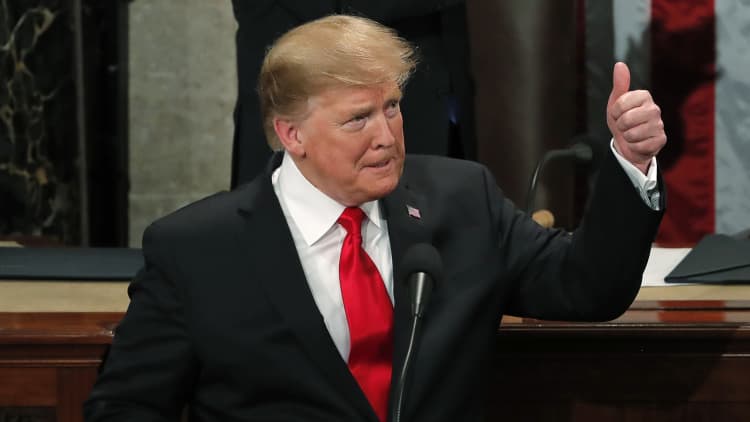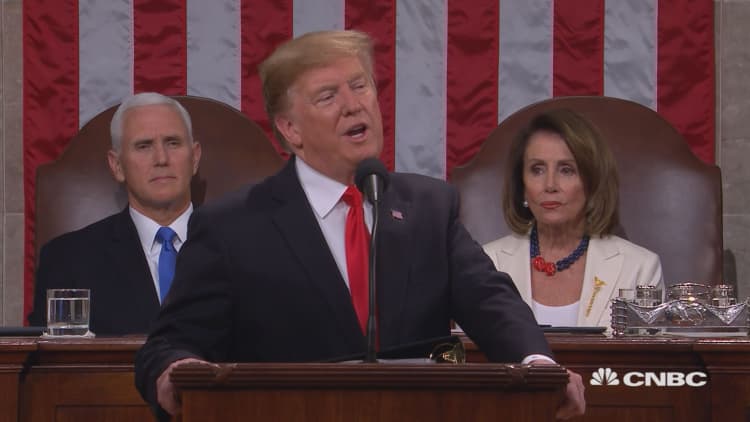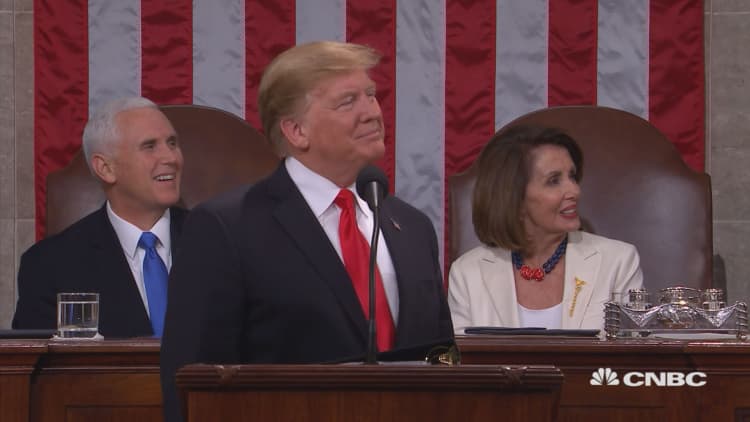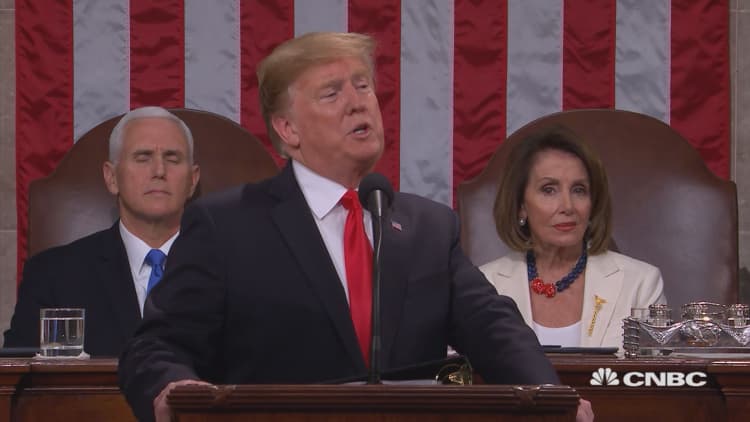President Donald Trump called for bipartisanship Tuesday night — as long as it leads to his desired policy outcomes.
In his State of the Union address, the president urged lawmakers to break "decades of political stalemate." But he pushed for progress in areas where Congress has failed to find consensus during his presidency, from immigration to infrastructure, trade and drug prices.
The president sought cooperation to address issues "neglected by leaders of both parties over many decades." Before a joint session of Congress, he asked Congress to "choose between greatness or gridlock, results or resistance, vision or vengeance, incredible progress or pointless destruction."

Trump's call for harmony in the early days of a divided government sounded the right note. However, the remarks come as the prospect of significant bipartisan work appears dim — and Trump continues to dig in on his priorities as he faces a perilous path to re-election in November 2020.
Congressional negotiators are struggling to reach a deal to overhaul the immigration system and avoid another partial government shutdown when three weeks of funding expire on Feb. 15. Earlier in the day, Trump did himself no favors in making his push for bipartisanship convincing. He railed against Democrats in a lunch with television anchors, including by calling Senate Minority Leader Chuck Schumer a "nasty son of a bitch," according to The New York Times.
In his remarks Tuesday night, the president outlined what he considers his successes, including economic growth, and pushed for what he calls "the agenda of the American people." Still, the issues Trump plans to target will hardly be easy to resolve in an era of divided government.
Trump pushed for an "immigration system that protects the lives and jobs of our citizens" — a goal that includes the divisive border wall that he has so far failed to build. Democrats did not yield to Trump's demand to fund the barrier, leading to a 35-day partial government shutdown during December and January. On Tuesday, he called for a "smart, strategic, see-through steel barrier" rather than the "simple concrete wall" that he proposed as a candidate.
"Simply put, walls work and walls save lives. So let's work together, compromise, and reach a deal that will truly make America safe," the president said as lawmakers on a bicameral, bipartisan conference committee appear far from an immigration agreement.

He also said that "both parties should be able to unite for a great rebuilding of America's crumbling infrastructure." Democrats and Republicans want to upgrade U.S. roads, bridges and tunnels, but need to resolve differences about how to fund the improvements.
Trump called investing in American infrastructure "a necessity" rather than an option, but did not go into details of how he wants to fund it. The White House has previously called for a mixture of public and private funding.
During his presidential campaign, Trump called for spending $1.5 trillion over a decade for infrastructure projects, but major funding has not been forthcoming.
Trump also pushed for "reversing decades of calamitous trade policies." The president is currently facing the toughest stretch in reaching his campaign goal of rebuilding U.S. trade relationships. He aims to overcome congressional skepticism to pass a new North American trade agreement and strike a trade overhaul with China by March 2.
"I have great respect for President Xi [Jinping], and we are now working on a new trade deal with China. But it must include real, structural change to end unfair trade practices, reduce our chronic trade deficit and protect American jobs," he said.
Even many Democrats agree with Trump's effort to revise trade deals and enforce better protections for U.S. workers. But members of both parties who favor free trade have pushed back against his tariff policy that threatens a devastating trade conflict with China if the world's two largest economies cannot strike a new agreement.
In addition, Trump called for lawmakers to "do more" to cut drug prices, calling it "unfair" that medicine in the U.S. often costs more than in other countries. Still, Republicans and Democrats need to agree on how best to reduce those costs for consumers.

The president said he aimed to shield protections for people with pre-existing conditions enshrined in the Affordable Care Act — a line that earned more applause from Democrats than Republicans. A GOP-backed lawsuit that could gut those protections is working its way through the court system. Democrats gained a net 40 House seats, and a majority in the chamber, in part through criticism of Republican efforts to repeal Obamacare.
One of the more raucous moments Tuesday night came when Trump, touting the economy he oversees, said women filled more than half of new jobs created last year. Democratic women in the House, many of whom defeated Republican men last year to earn their new gigs, stood and cheered, then chanted "U.S.A.!"
The State of the Union address came after House Speaker Nancy Pelosi and Democrats dealt Trump a blow on one of his signature issues, immigration. The party has repeatedly hammered Trump for the border wall impasse and shutdown, which caused hundreds of thousands of federal workers to miss two paychecks. For years before this week's immigration talks, the issue has proven intractable in Congress.
Democrats, who control the House but not the Senate, put the partial closure front and center on Tuesday night as many lawmakers brought government employees who lost pay as their guests. The shutdown even led to a delay of the State of the Union, as Pelosi barred Trump from making the remarks in the House chamber until the government reopened.
When a White House official previewed Trump's speech last week, the intended calls for bipartisan cooperation were met with skepticism. The president has called for civility and unity at numerous points during his time in the White House, only to take jabs at his political foes soon after.

Trump took swipes at more than Schumer as he previewed his speech earlier in the day, according to the Times. He called former Vice President Joe Biden, a potential 2020 presidential foe, "dumb."
The president used the derisive nickname "Pocahontas" for another potential Democratic candidate, Sen. Elizabeth Warren. The senator has claimed Native American heritage.
He also criticized the late GOP Sen. John McCain for voting against a Republican health care plan and suggested that the lawmaker's book "bombed."


